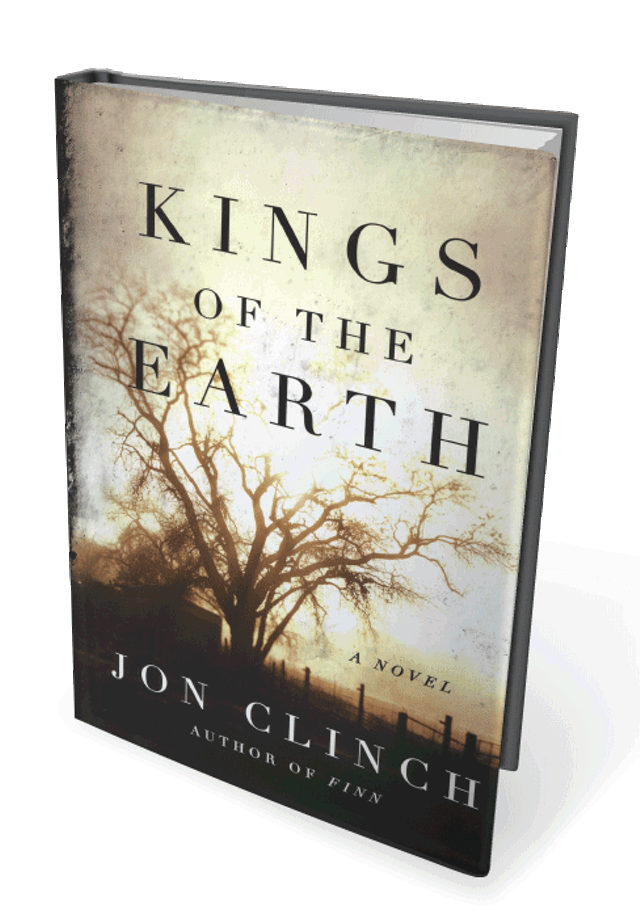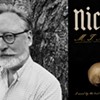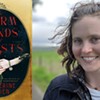Published August 4, 2010 at 9:41 a.m.
When you read Vermont fiction, you absorb lots of detailed descriptions of people doing things with their hands. Blacksmithing, sugaring, lumbering, milking, tending livestock — name a traditional skill or handicraft and some local author has probably put it on paper. Particularly in these parts, many writers are self-styled anthropologists, documenting a fading world where people created things without the intervention of software.
Jon Clinch of Plymouth is a prime example. But in his second novel, Kings of the Earth, Clinch has made a good, sly choice. He focuses as much on destruction — on the weathering, wearing down, atrophying power of a traditional rural life — as on creation. He knows that part of what fascinates us about people who still live the “old ways” is everything that can go wrong. The dirt, the rot, the accidents, the unorthodox family and sleeping arrangements, the untreated growths, the broken refrigerator covered by a “yellow haze of mold,” and maybe the occasional murder.
When state trooper Del Graham arrives at the upstate New York farm of the three Proctor brothers to investigate the death of the eldest, entropy is what he finds, passing through “the open front door as into a mouth full of rotted teeth. The disarray and the stink. The order and the purposefulness gone to no use in the end.”
Clinch’s Proctors are loosely based on the Ward brothers of Munnsville, N.Y., whose case inspired the 1992 documentary Brother’s Keeper. In their fifties and sixties in 1990, when the novel’s action begins, the men have never married and seldom left their dairy farm. Their father, a raging drunk, died when they were children; their mother lasted into the ’60s. Creed, the youngest, did a stint in Korea during the war. But he and elder brother Vernon are fiercely loyal to each other and to their middle brother, Audie, whom his father described in the parlance of an earlier era as an “idiot child.”
The novel has multiple voices, and one of Clinch’s themes is that people are what we make of them. Today, doctors might place the sensitive, flailing Audie on the autism spectrum. To the city folks who occasionally drive up to the farm and purchase his wood carvings, he’s an outsider artist.
To Preston Hatch, a more worldly fellow who’s been the brothers’ next-door neighbor since the Depression, all three Proctors are emblems of continuity — something he prizes, even as he buys himself the newest model of everything. “Everything goes the same today as it went yesterday,” Clinch writes in Preston’s voice. “That’s how it is around a farm. A farm is the master of you and not the other way around.”
But, of course, things do change. They change when the brothers’ nephew, Tom — offspring of the only Proctor child who got away — decides the old homestead is a good place to grow weed. And again when Vernon dies in his sleep, and the medical examiner thinks someone helped him along.
Like the brothers’ existence, Kings of the Earth isn’t a thrill a minute, and its most “plotty” sections — those dealing with young Tom, his lowlife friends and his illicit business operations — are its weakest and most conventional. Nonetheless, at nearly 400 pages, the novel is a speedy and gripping read.
That’s because the author has made a second smart choice, purely stylistic: He’s split his story into short sections narrated from various viewpoints and jumbled them chronologically. The novel leaps back and forth in time, each section datemarked: If we’re not interested in the brothers’ early life in the 1930s, or in the pot-smuggling plot of the 1980s, we’ll keep reading for the murder investigation in 1990.
The technique keeps readers slightly off balance — a good way to hook those who might never make it through a long Victorian novel, or even this story if it were told in order. In his stark, sometimes oracular language and his use of multiple narrators, ranging from the childlike Audie to the sardonic salesman DeAlton, Clinch emulates one of the old American masters: William Faulkner. But his scrambled narrative is oddly well suited to a newer world of short attention spans.
Writers who want to capture a “simpler” time still have to find ways to reach readers who have thousands of entertainment options at their disposal. Clinch comes close to saying this flat out in a passage voiced by the county district attorney, who’s trying to decide how he’d present Vernon’s alleged murder to a jury. “Above all — and I know this sounds cynical — you have to keep it interesting ... you have to remember how much television people watch these days.”
And you don’t land in the number-one spot on O magazine’s 2010 Summer Reading List without making things interesting. Clinch’s book has earned that honor. Through well-turned phrases and narrative sleight of hand, he persuades us to immerse ourselves in decades of grinding rural routine.
Kings of the Earth has its odd choices and its blind spots. Its narrative voice skips from present to past tense, from “literary” third-person narration to rougher internal or external monologues, iwn ways that can feel arbitrary. Amid all this perspective hopping, the experiences of the brothers’ mother, Ruth, and their sister, Donna, get little time, suggesting that this is essentially a tale of the forces and foibles of men. We never learn how Donna managed to get herself an education and leave the farm while her brothers stayed — though any reader can guess why she escaped.
Indeed, the whole novel is a pretty eloquent argument against going straight back to the land. “Farmwork will do that to you,” muses Preston — who, with his modern skills and tools, extricates the brothers from many an ugly jam. “It’ll build you up for a while and then it’ll wear you back down.” If it weren’t for the working TV beside their rotting fridge, the Proctors could be mistaken for preindustrial peasants. Some, less tactful, might compare their sleeping and hygiene habits to those of animals.
But here’s the thing: They’re like us. The novel finds its greatness in passages where the brothers perceive each other’s distress and comfort each other — simply, with presence and touch. Kings of the Earth is about their bond and, to a lesser degree, about the bond of love mixed with nostalgia that makes Preston their champion.
Compassion can take strange forms, Clinch shows. When young Vernon wants to make sure Audie doesn’t hurt himself with knives, he ruthlessly slices his brother’s palm, then teaches him to whittle — to master the source of his pain so it becomes a source of beauty. Human ingenuity may not prevail against decay, but it has its moments.
Kings of the Earth by Jon Clinch, Random House, 393 pages. $26.
Jon Clinch reads on Thursday, August 12, 7-8 p.m., at Briggs Carriage Bookstore in Brandon; and at the Burlington Book Festival on Saturday, September 25, time and location TBD.
Excerpt from Kings of the Earth
Her brothers moved like the ghosts of drowned men traversing the ocean floor. Their pale hair and their pale beards wavered on the light wind as on deep currents. They went slowly and methodically, as if they and their aims were older than time and long past any need for urgency. The longer [Donna] lived in town, the more she took note of this antique strangeness of theirs. And seeing them now as she came up the dirt lane — Audie bent over the tractor, Vernon feeding the chickens, Creed dragging a spade toward the barn — she pictured her three brothers preserved in grainy black and white or some aged murky sepia. Perhaps not even that. Perhaps a woodcut.
Yet the two oldest had walked the earth for not even a century between them. The youngest was not yet forty and looked half again that. Work and woe had done to these men not their worst but just their usual, which was enough.
More By This Author
Speaking of...
-

The Distant Snowy Mountain: a Short Story
Dec 20, 2023 -

Review of Sen. Patrick Leahy's New Memoir
Aug 26, 2022 -

Bennington Review Wins Prestigious Literary Prize
Jul 15, 2022 -

Fiction: Concerning the
LossTriumph of the 'VSS Conquest'Dec 22, 2021 -

North Country Author Russell Banks On His Latest Novel, 'Foregone'
Mar 10, 2021 - More »
Comments
Comments are closed.
From 2014-2020, Seven Days allowed readers to comment on all stories posted on our website. While we've appreciated the suggestions and insights, right now Seven Days is prioritizing our core mission — producing high-quality, responsible local journalism — over moderating online debates between readers.
To criticize, correct or praise our reporting, please send us a letter to the editor or send us a tip. We’ll check it out and report the results.
Online comments may return when we have better tech tools for managing them. Thanks for reading.










































